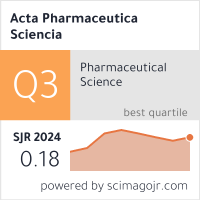ACTA Pharmaceutica Sciencia
2025 , Vol 63 , Num 1
Phyto-metabolomic investigation and anti-migratory potential of Moringa oleifera Lam. and Moringa peregrina (Forssk.) Fiori against hepatic carcinoma cell line
1 Theodor Bilharz Research Institute, Department of Medicinal Chemistry, 12411, Giza, Egypt2 Theodor Bilharz Research Institute, Department of Biochemistry and Molecular Biology, 12411, Giza, Egypt
DOI : 10.23893/1307-2080.APS6310 Viewed : 2700 - Downloaded : 1055 The present study aims to characterize the active ingredients of Moringa oleifera (MO) and Moringa peregrina (MP) leaf extracts and evaluate their cytotoxic and anti-migration efficacies against liver cancer cells (HepG2). The chemical profiling of the aqueous and methanolic extracts of both Moringa species was carried out using LC-ESI-MS led to identifying of 37 compounds classified as flavonoids, phenolic acids, glucosinolate, and phenyl ethanoid. The MTT assay was used to assess the cytotoxic effect, which revealed to, the increasing of the MO and MP extracts" concentration adversely decreased the treated cells" viability. Treating of HepG2 cells by MO and MP for different time intervals effectively inhibited wound closure, while the cells migratory ability in the treated cells was decreased. This study reports that MO and MP extracts exhibited promising cytotoxic effects and inhibited migration of highly metastatic HepG2 cell lines, which may be due to the presence of polyphenolic compounds. Keywords : Moringa, anti-migration, HepG2, LC-ESI-MS, phenolic compounds





